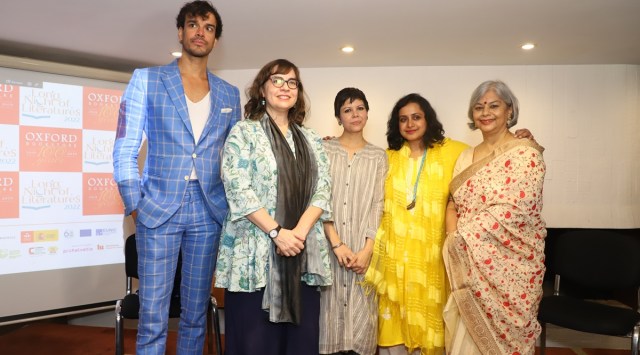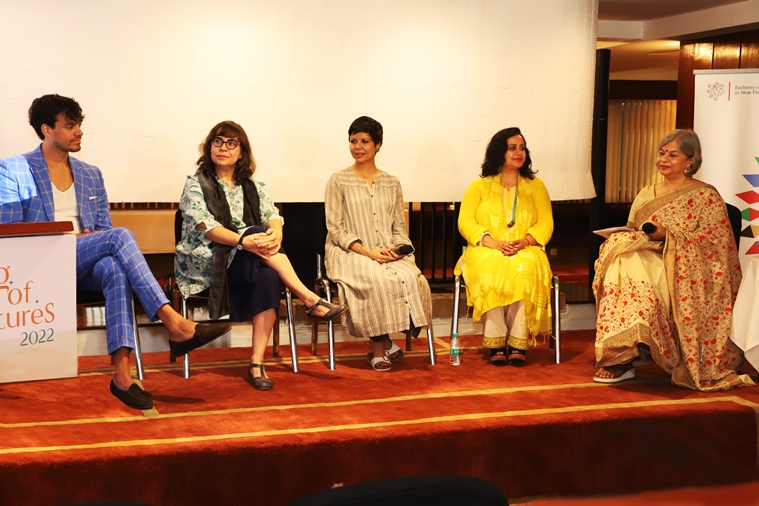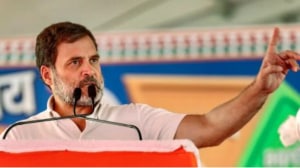‘Lit fests should be more disruptive, writers should not write books just to get movie adaptations’
Writers and publishers from India, Germany and Spain discussed the evolving modes of literature and the publishing industry's future
 The event happened at the Embassy of the Czech Republic, New Delhi, on Thursday. (Picture credit: Oxford Bookstore and Long Night of LiteratureS)
The event happened at the Embassy of the Czech Republic, New Delhi, on Thursday. (Picture credit: Oxford Bookstore and Long Night of LiteratureS)The Long Night of LiteratureS, an international collaboration between India and 11 European countries that annually celebrates literary diversity, began at the Embassy of the Czech Republic, New Delhi, on Thursday with a discussion on the shortened cultural distance between Indian and European literatures – enabled by widening publishing networks and a growing interest in translation. The talk, “Changing Literary Landscapes in India and Europe”, organised in collaboration with Oxford Bookstore, was attended by Janice Pariat, writer and Assistant Professor of Creative Writing and History of Art, Ashoka University; Milee Ashwarya, publisher, Penguin Random House India; Krisha Kops, author and journalist; Mercedes Cebrián, Spanish poet and translator; and moderated by author and translator Sutapa Basu.
Buy Now | Our best subscription plan now has a special price
Among the arenas explored were the changing modes and formats of storytelling over the decades, with Kops saying he observes a “dangerous” trend of writers of books emulating and competing with social media and video platforms. This leads to books that are not as provocative or challenging as they could be. “It becomes about writing books that can be adapted to Netflix films, or thinking only of entertainment, of hitting the numbers… It’s a disturbing tendency that thinks only about the audience.”
Pariat responded that many societies, like Northeast India, have rich oral storytelling traditions that don’t venerate the written book as much. She added that modern interest in audiobooks and podcasts “seems to have brought things full circle.” “Some parts of the world were never interested in reading, and that’s okay… Their ways of understanding the world and consuming stories have come from different resources,” she added.
 The talk was attended by Janice Pariat, writer and Assistant Professor of Creative Writing and History of Art, Ashoka University; Milee Ashwarya, publisher, Penguin Random House India; Krisha Kops, author and journalist; Mercedes Cebrián, Spanish poet and translator; and moderated by author and translator Sutapa Basu. (Pic credit: Oxford Bookstore and Long Night of LiteratureS)
The talk was attended by Janice Pariat, writer and Assistant Professor of Creative Writing and History of Art, Ashoka University; Milee Ashwarya, publisher, Penguin Random House India; Krisha Kops, author and journalist; Mercedes Cebrián, Spanish poet and translator; and moderated by author and translator Sutapa Basu. (Pic credit: Oxford Bookstore and Long Night of LiteratureS)
On translation, Cebrián said that there has long been a fear that the English language will be “the big mouth that eats everything” but the Anglo-American market holds power and enables exchange of ideas. “In Spanish, we earlier used to even translate names — for example, William Shakespeare would become Guillermo Shakespeare! We don’t do that anymore, so translations also reflect how societies evolve,” she said, adding, “We keep certain names [in the translated language] identical to the original language, so the reader has to make the effort of looking it up [for the original effect].”
As the talk shifted to diversity and representation in literary fests, Pariat added a note of caution against writers being typecast into only certain parts of their identities. “Why should queer writers only be on queer panels or Dalit writers only on Dalit ones?” she said, adding, “Lit fests should be more critical, unruly and disruptive.”
Basu mentioned the rising costs of paper in the book production cycle, and challenges that the publishing industry might face, to which Ashwarya said that the physical book is here to stay because the experience of reading one is irreplaceable. “Penguin did well in the pandemic too, and it helped us innovate too on what we publish and how we design our lists. The industry is only growing,” she said.
📣 For more lifestyle news, follow us on Instagram | Twitter | Facebook and don’t miss out on the latest updates!
- 01
- 02
- 03
- 04
- 05































